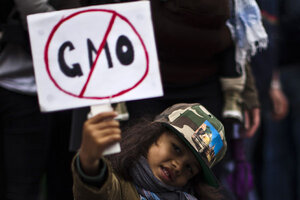GMOs and a potential US-Europe pact
How a food fight could derail talks on a lucrative free-trade treaty.

A girl holds up a sign during a protest against US-based Monsanto Co. and genetically modified organisms (GMO), in New York May 25, 2013.
Eduardo Munoz/REUTERS
The United States and Europe have reportedly begun negotiations for a new free-trade agreement that would be the biggest in the world and provide an enormous boost to both parties' sagging economies. But a disagreement over genetically modified organisms (GMOs) could scuttle a trade pact. Here's why:
Q: Why are GMOs so controversial?
Proponents of GMOs note that most studies on the products (including corn, soybeans, sugar beets, dairy products, cotton, papayas, and zucchini) have deemed them safe for human consumption. They point to benefits like more-efficient food production and superior nutritional content or taste.
Critics say that most studies on GMOs are short-term and that the long-term effects are unknown. Even the short-term risks are still not fully known, they say. More needs to be done to determine possible effects on human health as well as on the environment, including the evolution of "super pests" that could devastate sustainable agriculture.
Some critics advocate a total ban on GMOs; others call on more oversight of the industry, including labeling of foods containing GMOs, until more data is collected.
Q: What is the US position on GMOs?
Most American agricultural products contain GMOs. Last year, genetically modified crops represented 88 percent of all corn and 93 percent of all soybeans grown. Both crops are used as animal feed and are common ingredients in processed foods. Though some 90 percent of Americans support the labeling of GMO products, few states require it, and there is no national statute. GMO producers, like major genetically modified corn retailer Monsanto, have said that labeling such products suggests that they are unsafe, although most current evidence suggests that there are no negative side effects. In general, GMOs in the US aren't treated much differently than non-GMOs.
Q: What is the European position on GMOs?
European regulations on GMOs are far more stringent than those in the US. The European Union bans or restricts the import of a large number of US products containing GMOs, including hormone-treated beef, pork produced from hormone-fed pigs, and genetically modified corn and soybeans. Within the EU's own borders, GMOs are not entirely banned, but the products are far less prevalent than they are in the US: Only about 1 percent of EU farmland has genetically modified crops under cultivation. Since 1998, the EU has required all foods containing GMOs to be labeled as such.
Q: What do both sides hope to gain on the subject of GMOs?
One of the broad goals of the US in the talks is to reduce the tall barriers to importing agricultural products to Europe. A range of American stakeholders, from the US Chamber of Commerce to large-scale farmers and GMO manufacturers have called the European bans on American GMOs protectionist. Such bans hurt large swaths of the US economy and give an unfair advantage to European farmers, they say.
After the US filed a complaint about such protectionism with the World Trade Organization in 2003, the EU reduced some barriers to agricultural trade, including raising the quota on hormone-treated beef. British and German officials characterize those concessions as a gesture of willingness to negotiate the issue in the current talks. But other EU nations are taking a firm anti-GMO line, hoping for an agreement that will boost trade without compromising Europe's policies on GMOs. French President François Hollande says that GMOs are not up for discussion, and EU officials say that a too-aggressive US approach on GMOs could derail the trade talks.
Q: How is culture a factor in all of this?
European farmers say that their "brand" depends on their producing natural products grown on small farms, noting that impeccable cuisine made from fresh ingredients is at the heart of European identity. American GMO products could pressure small farms (about a tenth the size of the average US farm) to scale up in order to compete. That would compromise European culture, they say.
American stakeholders also suggest that the EU's barriers to US imports reflect a European-purveyed stereotype that consumer safety is not a priority in American culture, or at least not as high a priority as it is in Europe.

